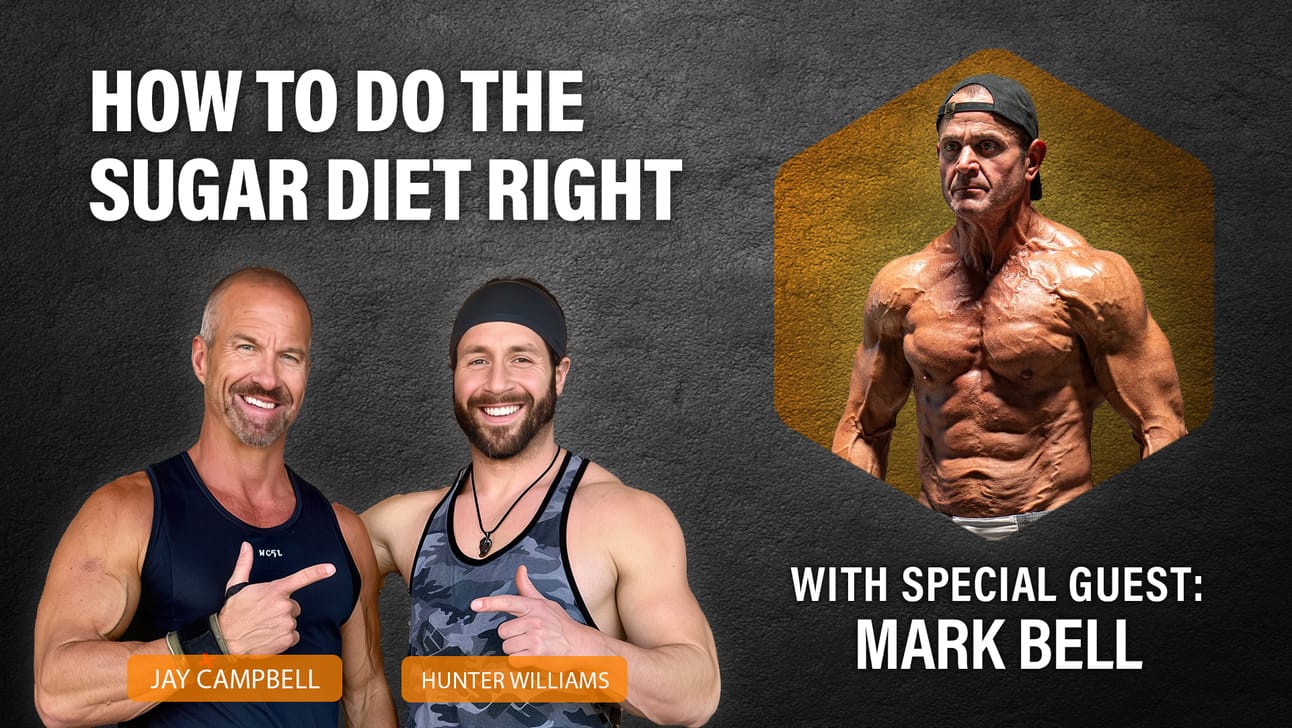Happy Wednesday!
Stop what you’re doing—because you do NOT want to miss this.
Tonight at 7 PM EST, Jay Campbell and I are teaming up with the one and only Mark Bell for a live stream that’s set to blow the roof off the “sugar diet” controversy.
If you’ve been seeing this high-carb, high-sugar, ultra-low-fat approach going viral on social media, you probably have questions—and we’re going to deliver the science, the stories, and the advanced nuance nobody else is talking about.
You can join us LIVE at 7 PM EST—make sure to grab your spot, bring your questions, and get ready for some unfiltered truth!
What is the Sugar Diet Craze?
Let’s kick things off with the basics.
The “sugar diet” is actually rooted in some emerging, science-backed ideas around a metabolic hormone called FGF21.
The short version? It’s a high-carb, ultra-low-fat, moderate-protein approach that uses carefully structured sugars (like fruit, honey, and even rice syrup) to stimulate FGF21.
That’s the hormone that helps your body burn fat, ramp up metabolic rate, and—here’s the kicker—lets you eat more carbs without gaining fat .
If that sounds crazy, you’re not alone.
Most of us grew up thinking sugar is the enemy. But when you combine the right macros, the right food sources, and the right training, you can unlock a whole new metabolic gear.
That’s exactly what’s fueling this “sugar diet” movement that’s suddenly everywhere.
Why Is the Sugar Diet Working So Well?
Here’s where it gets interesting—and why people are seeing results that defy old diet dogma.
First, FGF21 is a master metabolic regulator.
When you stimulate FGF21 (with high-carb, low-fat eating, and strategic exercise), your body starts:
Burning more calories at rest
Shuttling carbs into muscle instead of fat cells
Increasing fat oxidation (yes, you burn more fat even on high carbs)
Enhancing energy and recovery
Preserving muscle, even on lower protein
Energy, recovery, and strength all improved .
This is a game-changer for anyone who’s tired of the “keto/carnivore yo-yo” or endless calorie restriction.
The sugar diet, when structured correctly, unlocks metabolic flexibility.
You stop fearing carbs—and you start burning fat more efficiently than ever.
What’s Actually Happening In the Body?
Let’s geek out for a second on FGF21.
Carbohydrates (especially fructose + glucose from fruit and honey) are the primary driver of FGF21.
FGF21 is only maximized if you keep dietary fat ultra-low and protein moderate—otherwise, you suppress it and miss out on the benefits.
High-carb, low-fat, moderate-protein eating flips the metabolic switch: Your body stops storing fat, ramps up fat burning, and stays metabolically flexible. You can cycle between burning sugar and fat, and never get “metabolically stuck.”
You want the “secret sauce”? It’s this combo:
Carbs: 70–90% of total calories, mostly from fruit, honey, rice, juice, and some starches
Protein: 75–100g/day, using collagen, leucine, egg whites, seafood, chicken, ultra lean beef
Fat: <10–15% of total calories, only from MCTs or cacao butter if any
Layer in resistance training, HIIT, and zone 2 cardio, and you amplify FGF21 even more.
Why Does It Work When Other Diets Don’t?
The sugar diet flips the script on what you’ve been told by mainstream fitness:
Keto and low-carb approaches slow your metabolism over time, reduce glycogen, and make you “carb intolerant.”
High-protein bulking can suppress FGF21, which makes it harder to stay lean.
High-carb, high-fat diets (the classic “dirty bulk”) spike insulin resistance and make fat gain nearly inevitable.
But when you dial in high carbs, low fat, and the right proteins, FGF21 turns you into a metabolic machine.
You build or preserve muscle, stay lean, and have energy to burn.
And for the science heads: animal studies show FGF21 lets mice eat high-carb diets without gaining fat, and human athletes are seeing the same effect when they apply the protocol properly .
Advanced Questions We’ll Tackle with Mark Bell Tonight
Here’s a sneak peek at the kind of advanced, nuanced questions we’ll dive into tonight:
1. How does FGF21 interact with growth hormone and peptide-based fat loss therapies? Can we use peptides to further amplify the sugar diet’s effects?
2. Are there hormonal “resistance” effects (like insulin resistance) with long-term high-carb/low-fat dieting? How do you cycle in fasting, refeeds, or “cheat” days to prevent metabolic adaptation?
3. For those using testosterone, TRT, or other hormone optimization, does the sugar diet change your SHBG, estrogen, or androgen metabolism?
4. What’s the best way to periodize the sugar diet for performance athletes vs. fat loss clients? Should you adjust macros based on training volume, or keep it steady year-round?
5. How do different carbohydrate sources (fruit vs. pure glucose vs. starch) change FGF21 output, and are there “stacking” effects if you combine them with certain peptides or supplements (like MCT oil or collagen)?
6. What does the data say about high-carb, low-fat diets and long-term cardiovascular health, especially for those using other compounds (GLP-1 agonists, etc.)?
7. How do you “fix” a broken metabolism (low HRV, high fasting glucose, chronic fatigue) using this protocol—especially in people with years of low-carb dieting, adrenal fatigue, or chronic inflammation?
PLUS we’ll be taking your questions LIVE!
See You at 7 PM!
To everyone who reads my emails—thank you for being part of the health optimization community.
Jay, Mark, and I are on a mission to cut through the noise and help you get leaner, stronger, and healthier (without going insane counting calories or fearing fruit).
Set your reminder: 7 PM EST, tonight.
Grab a notebook, bring your toughest questions, and let’s dig in to the REAL science behind the sugar diet.
Best,
Hunter Williams
